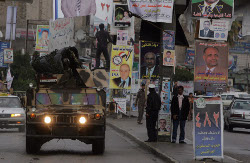Registration
Thank you!
You will receive an email confirming your registration.
IMGXYZ1107IMGZYXThe recent crisis in Gaza, upcoming Israeli elections, and Iraq’s provincial elections are reshaping the political landscape in the Middle East and providing new opportunities for Europe and the United States to play a constructive role.
A fragile ceasefire
Marina Ottaway said the ceasefire between Hamas and Israel is very fragile and faces both practical and political obstacles. The ceasefire does not include clear terms on the conditions under which crossings into Gaza would open, and what constitutes a violation of those conditions. At the same time, Israeli political parties are using the crisis in Gaza as a way to show commitment to a hardline approach against Hamas and to gain votes. Defining the terms of the agreement and who will monitor the crossings are necessary to preserve the ceasefire. Hamas will have to be included in the mechanisms for monitoring the crossings—there is no possibility that Fatah alone will be able to do this. Hence, a degree of reconciliation between Fatah and Hamas is crucial to the stabilization of the ceasefire.
Re-evaluation of regional positions
On the regional level, Arab countries like Egypt and Saudi Arabia – two key mediators in the Palestinian-Israeli conflict – are taking increasingly anti-Hamas positions. At the same time Hamas is gaining support from new players in the diplomatic process like Turkey and Qatar. Syria is not likely to restart indirect talks with Israel immediately over concern of being criticized for trumping the Palestinian-Israeli talks. The Arab public remains very sympathetic with Hamas in Gaza.
Advice for the Obama administration
Choosing George Mitchell as the special envoy to the Middle East, and sending him on a listening tour of the region, indicates that the Obama administration is searching for new ways to approach the Arab-Israeli conflict. A clear view of the administration’s next steps is yet to emerge.
The Obama administration needs to rely more on a multilateral approach toward Arab-Israeli peace, involving regional players. The U.S. should not delay initiating talks with Iran as these talks will have a direct effect on the security architecture in the Gulf. The U.S. also needs to define the nature of its new relationship with Iraq as it begins to quickly pull out its troops.
Questions and Answers
Ottaway stressed that the widening rift within the Arab League is not due to disagreement over the Arab Peace Initiative proposed by Saudi Arabia to end the Arab-Israeli conflict. The Arab League is divided on its approach towards the Hamas- Fatah struggle for control of the Palestinian Authority, and the formulation of a policy toward Iran’s rise as a regional power. The issue of new Palestinian elections cannot be discussed without reconciliation between Hamas and Fatah first. These realities offer Europe many opportunities for more direct involvement in Palestinian-Israeli negotiations. Europe could also lead the way in reversing the international community’s aversion to talking with Hamas, but the European Union’s ability to act remains low.
